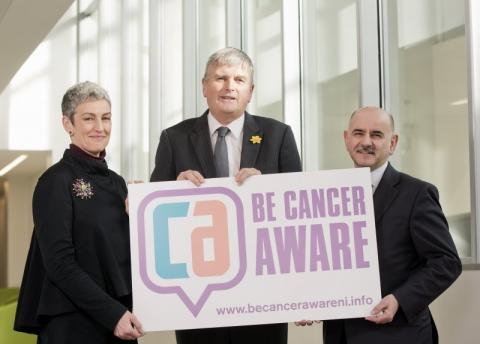Cancer campaign to raise awareness and save lives

At least one in three of us will get cancer, and with an increasing number of cases each year in Northern Ireland, the Public Health Agency (PHA) is launching a major new campaign aimed at raising awareness of signs and symptoms of cancer and encouraging people to speak to their GP if they experience any of them.
Nearly half of us (49%) would be put off going to the doctor if we had a symptom due to being worried about what they might find, but the earlier cancer is diagnosed, the easier it can be to treat, so the ‘Be Cancer Aware’ campaign highlights how important it is to know what to look out for and to get yourself checked if you notice anything which could point towards cancer.
The Health Minister Jim Wells said: “Public awareness of the signs and symptoms of cancer is a key factor in detecting cancers early and increasing the chances of successful treatment and survival. I welcome all efforts to empower individuals to make the best possible decisions and receive prompt clinical advice which will lead to improved outcomes of this terrible disease. Fear of the unknown can be a terrible barrier for individuals who may have concerns about their health, and can impede early diagnosis and treatment of many illnesses, including cancer, which may otherwise be treated more effectively.
“I hope this campaign will inspire confidence across the population to contact their GPs as soon as they have concerns about their physical health and the potential symptoms of cancer.”
Dr Miriam McCarthy, Consultant in Public Health Medicine at the PHA, said: “There are over 10,000 new cancer diagnoses each year in Northern Ireland. With advances in treatment and care over recent years, there is often a lot that can be done to tackle cancer when it appears, but early detection and treatment are essential.
“Survival rates in Northern Ireland for some cancers fall below what is achieved elsewhere in the UK and Europe. Some of this may be due to low levels of awareness of cancer symptoms and a reluctance to talk to a GP at an early stage.
“A survey undertaken on behalf of the PHA revealed that barriers to seeking help in relation to cancer symptoms include being worried about what the doctor might find and embarrassment. We are urging people to set these concerns aside and speak to their GP if they have any signs or symptoms.
“Finding cancer early and getting it treated can really make the difference and greatly improve the likelihood of survival.
“It is therefore vital for all of us to be cancer aware, to know the signs and symptoms of cancer, and to speak to a GP if we experience any of them.”
Cancer can strike at any age, but almost 9 out of 10 cancers are diagnosed in people over 50, so that group, in particular, needs to be aware of how important it is to recognise any changes to their body and speak to their doctor if something isn’t right.
Some of the common signs and symptoms you should ask your doctor to check out include:
- coughing up blood;
- blood in urine;
- blood mixed through bowel motion (stools);
- a change in bowel habit that lasts for more than six weeks;
- unexplained, significant weight loss (5kg/10lbs over a couple of months);
- a lump anywhere on your body;
- changes on your skin or to an existing mole (such as itching, bleeding or a change in shape or colour);
- a sore that doesn’t heal;
- symptoms that refuse to clear up, e.g. a cough or hoarseness that lasts for more than three weeks.
The multi-phased campaign is being developed in consultation with a broad range of cancer charities and stakeholders, and will begin with a cross-platform programme of general awareness-raising, before turning its focus to specific cancer sites in turn.
To support the campaign, the PHA has developed a comprehensive new website at www.becancerawareni.info. The website provides information about cancer signs and symptoms, explains what to do if you’re concerned, and signposts to recommended sources of support or further information.
ENDS
Information on cancer is also avail on NI Direct: www.nidirect.gov.uk/cancer.htm
